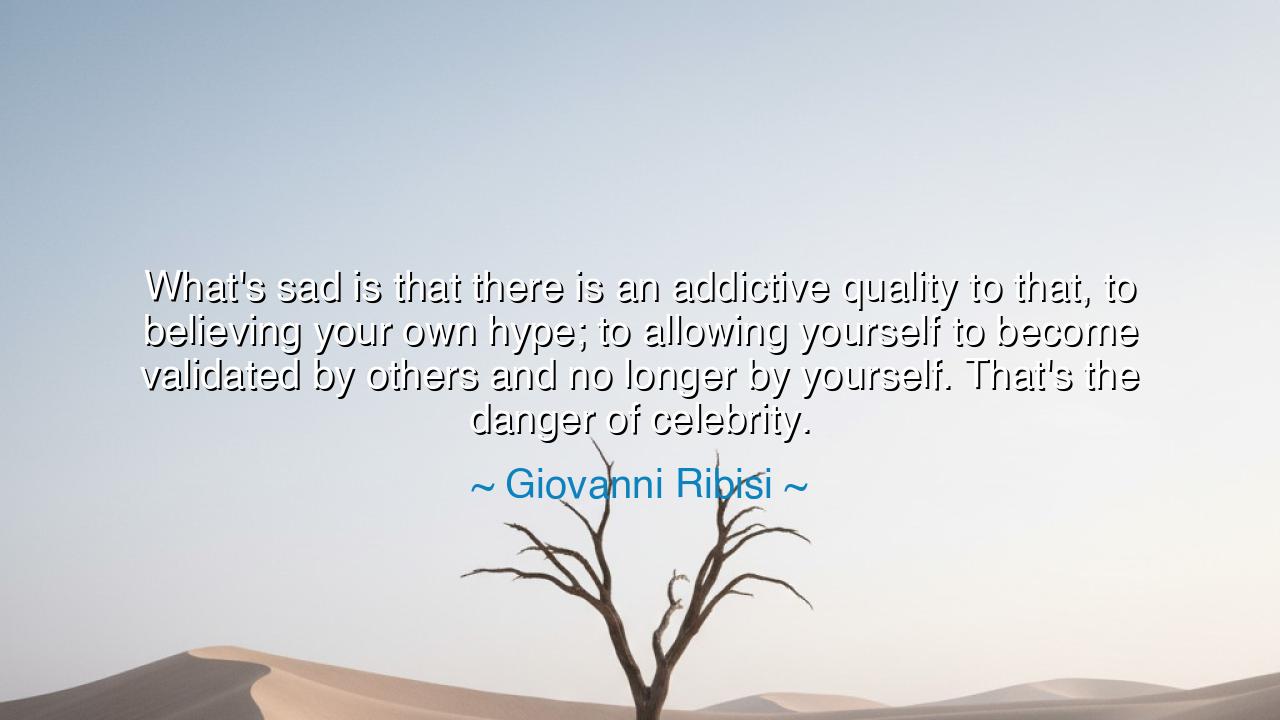
What's sad is that there is an addictive quality to that, to
What's sad is that there is an addictive quality to that, to believing your own hype; to allowing yourself to become validated by others and no longer by yourself. That's the danger of celebrity.






Hear the sobering truth spoken by Giovanni Ribisi, who unveiled the hidden danger of fame: “What’s sad is that there is an addictive quality to that, to believing your own hype; to allowing yourself to become validated by others and no longer by yourself. That’s the danger of celebrity.” In these words lies both a warning and a lament—that the shining crown of recognition, so sought by many, may in fact become a chain of dependence. For when the soul forgets to measure itself by its own worth, and instead hungers only for the applause of the crowd, it drifts from freedom into slavery.
The heart of the quote speaks of addiction, a word not chosen lightly. For just as wine or opium can bind the body, so too can the sweetness of praise enslave the spirit. To believe your own hype is to be intoxicated by illusion, mistaking the roar of the crowd for the voice of truth. But fame is fickle, its love shallow, its devotion fleeting. To build one’s identity upon it is to stand upon shifting sands, where the tide of public opinion can sweep away dignity in an instant.
History offers many examples of this peril. Consider the Emperor Nero, who began his reign with promise but became ensnared by his own legend. Surrounded by flatterers and drunk on spectacle, he came to believe himself more an artist than a ruler, more divine than human. In his thirst for validation, he destroyed his own city, murdered those closest to him, and ended despised by the very people whose adoration he craved. He was undone not only by cruelty, but by the addictive quality of believing his own myth.
But the danger is not reserved for emperors alone. Think of the countless artists and performers of our own age who, rising swiftly to celebrity, lose themselves in the illusion of invincibility. The applause that once gave joy becomes a necessity, like air to the lungs. Without it, they wither, and in seeking it ever more desperately, they descend into self-destruction. Their downfall is not because they lacked talent, but because they sought validation only from others, forgetting to anchor themselves in inner truth.
Yet Ribisi’s words also contain a path of wisdom: the reminder that the truest validation comes from within. The man or woman who knows their worth need not fear the silence of the crowd. Their value does not rise and fall with applause, for it is rooted in the soil of conscience, discipline, and authenticity. This is the armor against the danger of celebrity—to remember always that the voice of one’s own soul is more enduring than the clamor of the multitude.
Therefore, O listener, learn this lesson well: seek not to build your worth on the shifting sands of external praise. Be grateful for applause when it comes, but do not depend upon it for life. Strive instead to know yourself, to measure your deeds against the standard of truth and not the noise of the world. For the crowd’s love is fleeting, but the peace of self-knowledge is eternal.
Practical is this counsel: cultivate daily moments of silence, when you listen not to others but to your own heart. Ask yourself, “Am I proud of what I have done? Am I true to myself?” Surround yourself with those who value honesty over flattery, who will remind you of your humanity when others treat you as an idol. In this way, you will guard your spirit against the addictive intoxication of hype, and live in the freedom of authenticity.
So remember Ribisi’s wisdom: “That’s the danger of celebrity.” Fame can gild the outside but hollow the inside if one is not watchful. Let your worth come not from the voices of others, but from the steady flame within, and you will walk through the noise of the world unshaken, dignified, and free.






AAdministratorAdministrator
Welcome, honored guests. Please leave a comment, we will respond soon